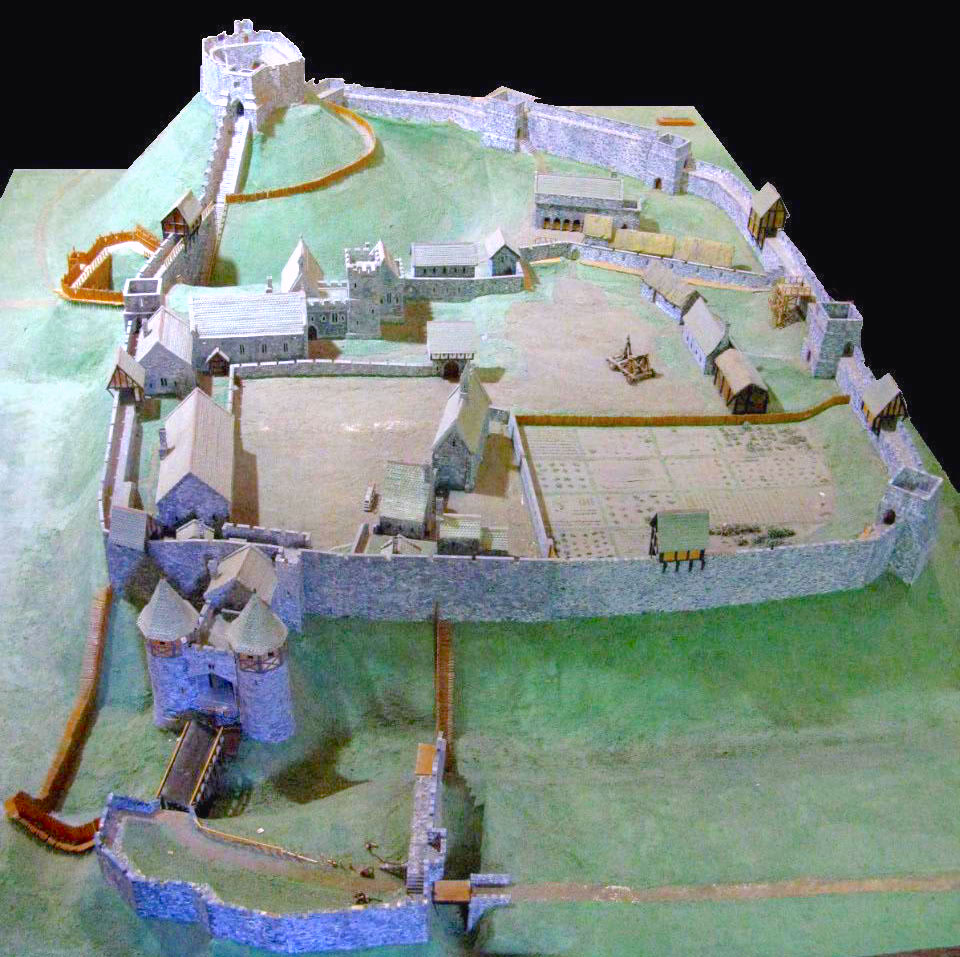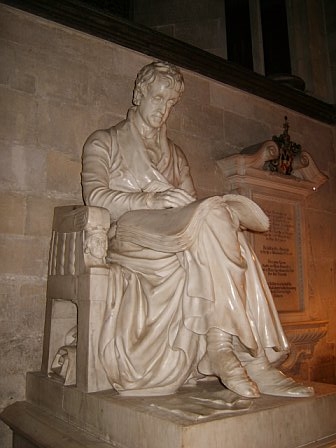|
Nicholas Wadham (1531–1609)
Nicholas Wadham () (1531–1609) of Merryfield in the parish of Ilton, Somerset, and Edge in the parish of Branscombe, Devon, was a posthumous co-founder of Wadham College, Oxford, with his wife Dorothy Wadham who, outliving him, saw the project through to completion in her late old age. He was Sheriff of Somerset in 1585. Origins Nicholas Wadham was probably born at Merryfield, a moated and fortified manor house, built around 1400 by his ancestor Sir John Wadham of Edge, a Justice of the Common Pleas in the reign of King Richard II. He was the only surviving son of John Wadham (d. 1578) of Merryfield and Edge, Sheriff of Somerset and Dorset in 1556, by his wife Joan Tregarthin (d. 1583), daughter and co-heiress of John Tregarthin of Cornwall, and widow of John Kelloway of Cullompton, Devon. Wadham's grandfather, Sir Nicholas Wadham (1472–1542), was a member of parliament in the English Reformation Parliament of 1529, Sheriff of Devon, Sheriff of Somerset and Dorse ... [...More Info...] [...Related Items...] OR: [Wikipedia] [Google] [Baidu] |
Nicholas Wadham
Nicholas Wadham may refer to: * Nicholas Wadham (1531–1609) Nicholas Wadham () (1531–1609) of Merryfield in the parish of Ilton, Somerset, and Edge in the parish of Branscombe, Devon, was a posthumous co-founder of Wadham College, Oxford, with his wife Dorothy Wadham who, outliving him, saw the ... * Nicholas Wadham (1472–1542) {{hndis, Wadham, Nicholas ... [...More Info...] [...Related Items...] OR: [Wikipedia] [Google] [Baidu] |
John Prince (biographer)
Rev. John Prince (1643–1723), vicar of Totnes and Berry Pomeroy in Devon, England, was a biographer. He is best known for his '' Worthies of Devon'', a series of biographies of Devon-born notables covering the period before the Norman Conquest to his own era. He became the subject of a sexual scandal, the court records of which were made into a book in 2001 and a play in 2005. Origins John Prince was born in 1643 in a farmhouse (now called Prince's Abbey) on the site of Newenham Abbey, in the parish of Axminster, Devon. He was the eldest son of Bernard Prince (died 1689) (to whom John erected a monument in Axminster Church) by his first wife Mary Crocker, daughter of John Crocker,Courtney, William Prideaux. " Prince, John (1643–1723)", ''Dictionary of National Biography'', London, 1885–1900, Volume 46. of the ancient Crocker family seated at Lyneham House in the parish of Yealmpton, Devon. Lyneham was, after ''Hele'' the second earliest known home of the Crocker family, ... [...More Info...] [...Related Items...] OR: [Wikipedia] [Google] [Baidu] |
John Kennall
John Kennall (aka John Kenold) (1511–1592) was Archdeacon of Oxford and a noted pluralist. Kennall was educated at Christ Church, Oxford. He was Canon of 8th preb., Christ Church, Oxford, from 1559 to 1592, Archdeacon of Oxford, Oxford, from 1561 to 1592, Canon of 6th preb., Rochester, from 1556 to 1559, and Archdeacon of Rochester, 1554–1560. He was for a time Vicar at St Columb Major in Cornwall and had a strong interest in the use of the Cornish language. Carew, who published his survey of Cornwall in 1602, notices the almost total extirpation of the Cornish language in his days. He says: ''The principal love and knowledge of this language liveth in Dr. Kennall, the civilian, and with him lieth buried, for the English speech doth encroach upon it and have driven the same to the utmost skirts of the shire''. The link between the Cornish language and Catholicism was also exhibited in the activities of Kennall, at St Columb, where he was still holding Mass as late as ... [...More Info...] [...Related Items...] OR: [Wikipedia] [Google] [Baidu] |
Corpus Christi College, Oxford
Corpus Christi College (formally, Corpus Christi College in the University of Oxford; informally abbreviated as Corpus or CCC) is one of the constituent colleges of the University of Oxford in the United Kingdom. Founded in 1517, it is the 12th oldest college in Oxford. The college, situated on Merton Street between Merton College and Christ Church, is one of the smallest in Oxford by student population, having around 250 undergraduates and 90 graduates. It is academic by Oxford standards, averaging in the top half of the university's informal ranking system, the Norrington Table, in recent years, and coming second in 2009–10. The college's role in the translation of the King James Bible is historically significant. The college is also noted for the pillar sundial in the main quadrangle, known as the Pelican Sundial, which was erected in 1581. Corpus achieved notability in more recent years by winning University Challenge on 9 May 2005 and once again on 23 February 2009 ... [...More Info...] [...Related Items...] OR: [Wikipedia] [Google] [Baidu] |
Field Of The Cloth Of Gold
The Field of the Cloth of Gold (french: Camp du Drap d'Or, ) was a summit meeting between King Henry VIII of England and King Francis I of France from 7 to 24 June 1520. Held at Balinghem, between Ardres in France and Guînes in the English Pale of Calais, it was a very expensive display of wealth by both kings. The summit was arranged to increase the bond of friendship between the two kings following the Anglo-French treaty of 1514. These two monarchs would meet again in 1532 to arrange Francis's assistance in pressuring Pope Clement VII to pronounce Henry's first marriage as illegitimate. Under the guidance of English Cardinal Thomas Wolsey, the both of these European states sought to outlaw war forever among Christian peoples. Though now in France, Balinghem was at the time regarded as part of the English kingdom. This caused some tensions between the English and French, as the latter preferred a location closer to the border, but topographical considerations proved ... [...More Info...] [...Related Items...] OR: [Wikipedia] [Google] [Baidu] |
Henry VIII
Henry VIII (28 June 149128 January 1547) was King of England from 22 April 1509 until his death in 1547. Henry is best known for his six marriages, and for his efforts to have his first marriage (to Catherine of Aragon) annulled. His disagreement with Pope Clement VII about such an annulment led Henry to initiate the English Reformation, separating the Church of England from papal authority. He appointed himself Supreme Head of the Church of England and dissolved convents and monasteries, for which he was excommunicated by the pope. Henry is also known as "the father of the Royal Navy" as he invested heavily in the navy and increased its size from a few to more than 50 ships, and established the Navy Board. Domestically, Henry is known for his radical changes to the English Constitution, ushering in the theory of the divine right of kings in opposition to papal supremacy. He also greatly expanded royal power during his reign. He frequently used charges of treason and ... [...More Info...] [...Related Items...] OR: [Wikipedia] [Google] [Baidu] |
Sheriff Of Gloucestershire
This is a list of Sheriffs and High Sheriffs of Gloucestershire, who should not be confused with the Sheriffs of the City of Gloucester. The High Sheriff is the oldest secular office under the Crown (in England and Wales the office previously known as sheriff was retitled High Sheriff on 1 April 1974). Formerly the Sheriff was the principal law enforcement officer in the county but over the centuries most of the responsibilities associated with the post have been transferred elsewhere or are now defunct, so that the High Sheriff's functions are now largely ceremonial. The High Sheriff changes every March. As of 2006, the Sheriff's territory or bailiwick is covered by the administrative areas of Gloucestershire County Council and of South Gloucestershire District Council. Sir Robert Atkyns, the historian of Gloucester, writing in 1712 stated that no family had produced more Sheriffs of this county than Denys. Sheriffs 12th and 13th century *1071–c. 1082: Roger de Pitres (Rog ... [...More Info...] [...Related Items...] OR: [Wikipedia] [Google] [Baidu] |
Thomas Howard, 3rd Duke Of Norfolk
Thomas Howard, 3rd Duke of Norfolk, (1473 – 25 August 1554) was a prominent English politician and nobleman of the Tudor era. He was an uncle of two of the wives of King Henry VIII, Anne Boleyn and Catherine Howard, both of whom were beheaded, and played a major role in the machinations affecting these royal marriages. After falling from favour in 1546, he was stripped of his Dukedom and imprisoned in the Tower of London, avoiding execution when Henry VIII died on 28 January 1547. He was released on the accession of the Roman Catholic queen, Mary I, whom he aided in securing her throne, thus setting the stage for tensions between his Catholic family and the Protestant royal line that would be continued by Mary I's half-sister, Elizabeth I. Early life Thomas was the son of Thomas Howard, 2nd Duke of Norfolk (1443–1524), by his first wife, Elizabeth Tilney (died 1497), the daughter of Sir Frederick Tilney and widow of Sir Humphrey Bourchier. He was descended in the fema ... [...More Info...] [...Related Items...] OR: [Wikipedia] [Google] [Baidu] |
Carisbrooke Castle
Carisbrooke Castle is a historic motte-and-bailey castle located in the village of Carisbrooke (near Newport), Isle of Wight, England. Charles I was imprisoned at the castle in the months prior to his trial. Early history The site of Carisbrooke Castle may have been occupied in pre- Roman times. A ruined wall suggests that there was a building there in late Roman times. The ''Anglo-Saxon Chronicle'' mentions that Wihtgar, cousin of King Cynric of Wessex, died in AD 544, and was buried there. The Jutes may have taken over the fort by the late 7th century. An Anglo-Saxon stronghold occupied the site during the 8th century. Around 1000, a wall was built around the hill as a defence against Viking raids. Later history From 1100 the castle remained in the possession of Richard de Redvers' family, and over the next two centuries his descendants improved the castle with stone walls, towers and a keep. In 1293, Countess Isabella de Fortibus, the last Redvers resident, sold th ... [...More Info...] [...Related Items...] OR: [Wikipedia] [Google] [Baidu] |
Captain Of The Isle Of Wight
Below is a list of those who have held the office of Governor of the Isle of Wight in England. Lord Mottistone was the last lord lieutenant to hold the title governor, from 1992 to 1995; since then there has been no governor appointed. Governors of the Isle of Wight *1509–1520: Sir Nicholas Wadham (1472-1542) of Merryfield and Edge, "Captain of the Isle of Wight". *1520–1538: Sir James Worsley *1538–1540: Thomas Cromwell, 1st Baron Cromwell (later Earl of Essex) *1540–1553: Richard Worsley *1553–1558: Sir William Girling *1558–1560: William Paulet, 1st Marquess of Winchester *1560–1565: Richard Worsley (reappointed) *1565–1583: Sir Edward Horsey *1583–1603: Sir George Carey, 2nd Lord Hunsdon *1603–1624: Henry Wriothesley, 3rd Earl of Southampton *1633–1642: Jerome Weston, 2nd Earl of Portland *1642–1647: Philip Herbert, 4th Earl of Pembroke *1647–1647: Robert Hammond *1648–1659: Col. William Sydenham *1660: Anthony Ashley Cooper, 1st Earl ... [...More Info...] [...Related Items...] OR: [Wikipedia] [Google] [Baidu] |
Sheriff Of Wiltshire
This is a list of the Sheriffs and (after 1 April 1974) High Sheriffs of Wiltshire. Until the 14th century, the shrievalty was held '' ex officio'' by the castellans of Old Sarum Castle. On 1 April 1974, under the provisions of the Local Government Act 1972, the title of Sheriff of Wiltshire was retitled as High Sheriff of Wiltshire.Local Government Act 1972: Section 219 at legislation.gov.uk, accessed 28 April 2020: ”Sheriffs appointed for a county or Greater London shall be known as high sheriffs, and any reference in any enactment or instrument to a sheriff shall be construed accordingly in relation to sheriffs for a county or Greater London". Sheriff To 1400 *1066: Edric *1067–1070: Philippe de Buckland *1085: Aiulphus the Sheriff *1070–1105: ...[...More Info...] [...Related Items...] OR: [Wikipedia] [Google] [Baidu] |





